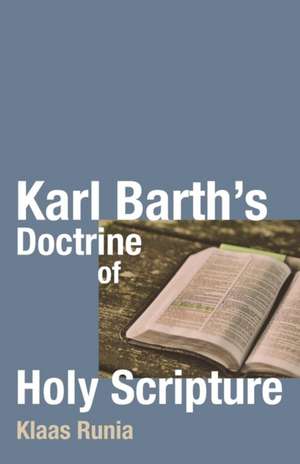Karl Barth's Doctrine of Holy Scripture
Autor Klaas Runiaen Limba Engleză Paperback – 27 noi 2018
| Toate formatele și edițiile | Preț | Express |
|---|---|---|
| Paperback (1) | 166.73 lei 22-36 zile | +13.64 lei 5-11 zile |
| Wipf and Stock – 27 noi 2018 | 166.73 lei 22-36 zile | +13.64 lei 5-11 zile |
| Hardback (1) | 279.47 lei 22-36 zile | |
| Wipf and Stock – 27 noi 2018 | 279.47 lei 22-36 zile |
Preț: 166.73 lei
Nou
Puncte Express: 250
Preț estimativ în valută:
31.90€ • 33.40$ • 26.40£
31.90€ • 33.40$ • 26.40£
Carte disponibilă
Livrare economică 17-31 martie
Livrare express 28 februarie-06 martie pentru 23.63 lei
Preluare comenzi: 021 569.72.76
Specificații
ISBN-13: 9781532663703
ISBN-10: 1532663706
Pagini: 240
Dimensiuni: 140 x 216 x 13 mm
Greutate: 0.31 kg
Editura: Wipf and Stock
ISBN-10: 1532663706
Pagini: 240
Dimensiuni: 140 x 216 x 13 mm
Greutate: 0.31 kg
Editura: Wipf and Stock
Notă biografică
Klaas Runia (1926-2008) was a highly respected theologian and church leader in the Reformed churches of the Netherlands and Australia. From 1956 to 1971 he was Professor of Systematic theology at the Reformed Theological College in Geelong, Australia. In 1971 he took up the chair of Practical theology at the Theologische hogeschool (later Universiteit) in Kampen, the Netherlands, a position he held until his retirement in 1992. He published extensively, including over thirty books and numerous articles in church journals.
